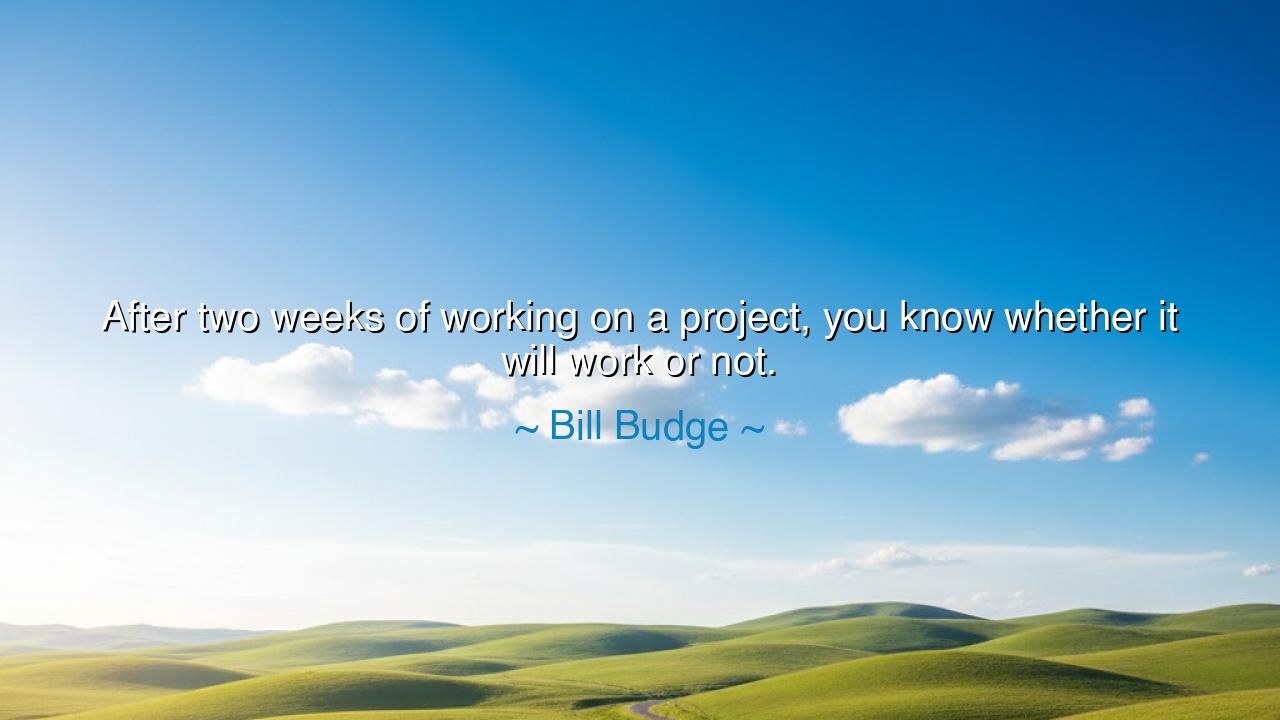
After two weeks of working on a project, you know whether it






Hearken, children of the ages, to the words of Bill Budge, who speaks of discernment and the measure of effort: "After two weeks of working on a project, you know whether it will work or not." Here lies a teaching of observation, patience, and insight, a reminder that the truth of any endeavor reveals itself not in grandiose hope, but in the early signs of its unfolding. The heart of creation is revealed in the rhythm of effort and the tangible responses of the task at hand.
Know that in these words there is both clarity and pragmatism. To work upon a project is to engage fully, to test vision against reality, and to confront the subtle signals of success or failure. Budge teaches that diligent attention in the early stages is the mirror in which the soul discerns possibility, and that understanding comes not from speculation, but from immersion in action.
Yet, consider also the wisdom of timing. Two weeks, though brief in the span of labor, is enough for the attentive spirit to sense the pulse of the endeavor. The project reveals its strengths, its weaknesses, and the path it demands. The ancients would counsel that insight often arises from early observation, when the heart and mind are alert, unclouded by the weariness of prolonged toil.
And behold, there is heroism in discernment. To see whether a project will work is to wield foresight, to act with intelligence, and to steer effort with purpose. Budge’s insight teaches that creation is both art and vigilance, and that those who labor wisely do not cling blindly to hope, but read the signs with courage, honesty, and precision.
Thus, remember, future generations: in the first days of endeavor lies the seed of understanding. Observe closely, attend fully, and let early work illuminate the path. The measure of success is not only in toil, but in the wisdom to recognize the signs that reveal whether the vision can truly work.
In the end, the ancients would say: labor with devotion, but listen to the echoes of your own creation. For in the unfolding of the project, the attentive soul discerns truth, and in that discernment lies the power to pursue what is viable and release what is not, ensuring that effort is both meaningful and fruitful.






HTNguyen Thi Huyen Trang
I can see how this quote reflects a fast-paced approach to decision-making, where after two weeks, you have enough information to know if something will work. But for me, it raises a question about risk-taking and resilience. What if the project feels uncertain, but you have the gut feeling it could work if you push through? How do we balance practicality with perseverance when trying to decide whether a project will succeed?
THhoang vo tuan hung
Bill Budge’s quote suggests a sharp intuition after a few weeks of work. I wonder, though, if this confidence is universal or if some fields or personalities require more time to analyze whether a project will succeed. Do some of us struggle to know when something is doomed to fail, even after weeks of work? How do we build the confidence to make those decisions early on without second-guessing ourselves?
BQBui Ngoc Bao Quyen
I find this quote intriguing, as it suggests that we should quickly assess whether a project will work. But isn’t there a risk of giving up too soon? Some projects take time to gain momentum, and early signs of failure don’t always mean it’s not worth continuing. How do we determine if a project should be pushed forward or if it truly needs to be abandoned? When is it wise to pivot versus giving up?
TLDuong Thùy linh
This perspective makes sense, especially in the world of technology and innovation, where rapid prototyping and iteration are key. However, I can’t help but think that it’s sometimes easier to predict success or failure in certain fields over others. How do we apply this mindset to creative projects, where the process might be more ambiguous? Can this mentality work in areas that are less tangible, like the arts or human development?
TMTa Thi Tra My
Bill Budge’s quote brings up an interesting point about the initial assessment of a project. It seems to imply that we can usually tell pretty early on if something will succeed. But what about long-term projects where early setbacks or challenges might not reflect the overall potential? How do we avoid the risk of abandoning something prematurely because we didn’t give it enough time to grow?